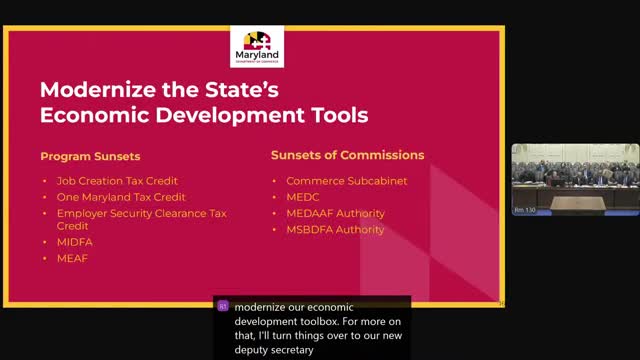Maryland Commerce proposes sunsetting incentives, consolidating authorities to focus development tools
Get AI-powered insights, summaries, and transcripts
Subscribe
Summary
Commerce Secretary Kevin Anderson told the Ways and Means Committee the administration will seek repeal or sunsetting of several tax credits and idle programs, consolidate authorities under the secretary, and redirect funds into targeted attraction tools in the governor's FY26 budget proposals.
Kevin Anderson, secretary of the Maryland Department of Commerce, told the Ways and Means Committee on Jan. 16 that the department will seek to repeal or sunset a series of longstanding incentive programs and consolidate authorities to streamline economic development work.
Anderson said the changes are part of a broader plan to “ensure that this is Maryland’s decade,” and to direct limited state resources toward programs with clearer returns on investment. He presented the administration’s FY26 budget proposals and organizational changes and described requested new funding for several targeted programs.
The administration’s proposals include repealing the job creation tax credit and the One Maryland tax credit program; repealing the employer security clearance costs tax credit; sunsetting the Maryland Industrial Financing Authority (referred to in the presentation as MITFA); and sunsetting the Maryland Economic Adjustment Fund. Ricardo Venn, deputy secretary for innovation and growth, said the job creation credit and One Maryland program have shifting minimum thresholds and unclear impacts and “we believe that it should be repealed” (paraphrased from testimony). Venn also said the employer security clearance costs tax credit lapsed in fiscal 2024 and the administration’s data do not show it functioning as an effective incentive.
Commerce told the committee that some programs have been underused: the department reported a fiscal 2024 allocation of $1,800,000 to the Economic Adjustment Fund but said only $75,000 had been distributed to businesses. The department also said repealing the employer security clearance credit would save an estimated $2,000,000 in fiscal 2026.
On governance and authority, the department proposed sunsetting the Maryland Economic Development Commission (MEDC) and reconfiguring Commerce’s subcabinet into a governor’s economic competitiveness subcabinet. The presentation said authority now exercised by several boards would be consolidated so that the commerce secretary approves assistance provided through certain programs (the presentation referenced “MITAF authority” and “MSBIDFA authority”).
Deputy Secretary Steven Rice described a set of changes to the state’s business-attraction tools that Commerce wants the General Assembly to enact. Those include converting the Sunny Day Fund into a strategic closing fund and locating it within Commerce with an initial proposed investment of $25,000,000 to use for business attraction. Rice said, “GOBA’s job is to provide a white-glove concierge service for priority or marquee business attraction or retention projects,” referring to the governor’s Office of Business Advancement, created by executive order and to be housed in Commerce.
Other administration proposals discussed by Commerce staff include: increasing the childcare capital loan program ($10,000,000 in the governor’s proposal); expanding MEDCO’s tax-increment financing powers; redirecting roughly $10,000,000 in annual casino (VLT) revenue toward MSBIDFA on an ongoing basis; increasing the maximum financial assistance available through MSBIDFA and reserving half its annual allocation for secretary-designated targeted sectors; and renaming MSBIDFA to the Maryland Economic Inclusion Fund and the VLT fund to the Reinvest for Success account.
Rice also described a proposed certified sites program to be administered by MEDCO, with $7,000,000 included in the budget proposal to prepare “move-in ready” parcels for business investment. He said the administration would move the RISE zone program from Commerce to MEDCO because MEDCO’s infrastructure role aligns with that program’s goals.
Commerce staff framed the changes as a shift from a broad “peanut butter” approach — spreading assistance widely — to a narrower, strategic focus on a smaller set of high-potential sectors. The department said it will continue to support businesses across sectors but will prioritize tools and funding for activities expected to produce larger job and investment multipliers.
No committee vote was taken during the briefing; Commerce sought feedback and legislative partnership. The department said follow-up conversations with the General Assembly and partner agencies will determine which proposals move forward as bills or budget language this session.
